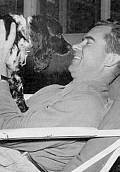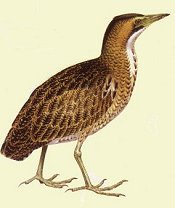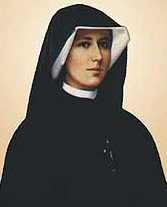It is a very long time since I last mentioned Blasphemous Ted Cargpan. Readers with long memories will recall that his dog won the Ayn Rand Household Pet Of The Week award back in March 2004. Shockingly, just two days after the prize-giving, the hound was abducted by paid fiends. Even more shockingly, Blasphemous Ted Cargpan announced that he did not care two pins nor a jot for the dog, and in any case he was bent on obtaining a goat.
Before examining in detail the thrilling story of how Blasphemous Ted got himself a goat, I should explain why he is never referred to as plain old Ted Cargpan. Both his father and his paternal grandfather, and several of his nephews, were called Ted Cargpan, though not one of them was blasphemous. But Ted, on the cold blustery morning of his eighth birthday, climbed a hillside bleak, and when he reached the top he bellowed out a volley of curses and imprecations at dozens and dozens of gods, shouting at the sky. Half an hour later he was sat in the back room of his parents' cottage, unwrapping his birthday gifts, a picture of piety. But the wind had carried his words far and wide, and it soon became known what he had done, and thereafter he was always known as Blasphemous Ted Cargpan.
Now, about this goat. Contumely was heaped upon Ted's head after he expressed a callous disregard for his abducted prize-winning dog - that is one reason he began to wear a grotesque sponge hood - but it was nonetheless true that his sights were already trained upon a goat. He had grown tired of his pooch, and even when it was returned to him after a daring night-time rescue operation carried out by the Ayn Rand Household Pet Rescue Squadron, he refused to go back on his word. It was at around this time, that is, around the time of the Tet Offensive in the Vietnam War, that Cargpan placed an advertisement in the Pang Hill Bugle.
Will swap dog for goat, it read, Toggenberg preferred. Seven words only, but seven words that had global repercussions. Busy anagrammatists in the Pentagon, convinced that it was a coded message, worked tirelessly to crack it. George, George, rotate a slop bin! Dwf lrf wgr pd! was one of their earlier, and baffling, efforts. With hindsight, it easy to laugh at the paranoia of the military, mistaking an innocent dog-goat exchange for something of more sinister intent. Blasphemous Ted Cargpan was not laughing, however, when, traced as the author of the advertisement, he was bundled into a jeep one morning and ferried to a compound deep below the earth's surface, where he was interrogated by interrogators for days on end.
Weirdly, each of the interrogators shared their name with a Hollywood star, so Cargpan found himself questioned by Lionel Barrymore, Claude Rains, Vilma Banky, Tyrone Power, Edna Purviance, Dorothy Lamour and Burgess Meredith. Seven interrogators, one for each word of the fateful text. It was Dorothy Lamour, allocated the word “Toggenberg”, who discovered on day twelve that Blasphemous Ted Cargpan was not Vietnamese, nor had any connection with the Vietcong.
Judging him useless, they decided to release him, but not before Tyrone Power suggested programming Cargpan's brain to turn him into a Manchurian Candidate-style assassin. The contents of Ted's skull, however, proved to be so uncanny that the idea was dropped, and in the middle of the night he was taken further down into the subterranean complex, to an underground cove, pushed into a rowing boat and towed out to sea.
Adrift for weeks, Blasphemous Ted Cargpan had ample opportunity to study natural phenomena, both common and uncommon. He watched, with his one good eye, the ephemeral beauty of clouds, cumulus, cumulonimbus, stratus, stratocumulus, altocumulus, cirrostratus, altostratus, nimbostratus, cirrus, and cirrocumulus, to use Luke Howard's terms, though of course Ted was ignorant of the Quaker cloud classifier. He looked at the surface of the sea. One night he was surprised by a shower of toads, and he noted that the light of the following dawn was bleached and eerie. Gulls, auks, skuas, guillemots, terns and other birds of the sea soared and swooped within his purview, to put it pompously, for “view” would do.
In ancient times it was foretold that Blasphemous Ted Cargpan would be rescued by a schooner, but the prophecy was wrong, for after eight weeks alone in the ocean he was picked up by a floating haberdasher. The haberdasher took him home to his seaside village, and as he walked unsteadily up his garden path, his prize-winning pooch came to greet him. It yapped happily. Cargpan thought it looked suspiciously well fed. Then he noticed, standing in the open doorway of his charming bungalow, holding a fork and a tin of dog food, Old Man Poxhaven from the Institute of Plastics, who was his bitter enemy.
“What in heaven's name are you doing in my house?” shouted Cargpan.
“Feeding your prize-winning dog, as a matter of fact,” said Old Man Poxhaven, a look of insouciance on his pallid face.
“I have been at sea,” said Cargpan, “And I would like a cup of tea.”
“Feeding your prize-winning dog, as a matter of fact,” said Old Man Poxhaven again.
“I said I would like a mug of piping hot tea!” yelled Cargpan, growing enraged.
Old Man Poxhaven simply repeated himself again, and only then did Ted Cargpan come to understand that the enemy in his doorway was a phantom. Later that day, after he had boiled the kettle and made a mug of piping hot tea using the one remaining teabag in his pantry, and put his feet up, and ground his teeth, Blasphemous Ted went to the library and consulted the newspapers that had appeared while he was out at sea, and discovered that Old Man Poxhaven had died a fortnight ago. “Siege At Institute Of Plastics Ends In Mayhem” said the headline of the Daily Cushion, while the Doppelganger Gazette reported the same story under the heading “Old Man Poxhaven Slain By Mutant Moth Beings”.
Cycling home via the track that bisected the dinghy marina, Cargpan wondered if his dog was also a ghost. It had plainly eaten its fill in his absence, but could a real pooch be fed by a phantom? Being a blasphemer, he knew little of the spirit world. He braked sharply when he caught sight of the dinghy depot, dismounted, and headed for the hut of the marina chaplain.
Father Tabbaglibnahatto was an elderly, crumpled priest who had ministered to the marina for over half a century. He was also a poet of some renown, whose finest work was probably Daft Ned, The Whelk, The Crocus, a completely anagrammatic rewriting of fellow Jesuit Gerard Manley Hopkins' The Wreck Of The Deutschland. Sheltering in his hut from a fine drizzle, Father Tabbaglibnahatto was surprised to see Blasphemous Ted Cargpan lumbering towards him. He clutched a crucifix in his gnarled fist and shrank back in the shadows. Cargpan hammered at the door of the hut.
“Are you in there, priest?” he shouted, “I need your spiritual advice! There is a ghost in my house that has been feeding my dog. Is such a thing possible?”
The good reverend held tight to his cross and prayed, desperately hoping that his blasphemous visitor would turn and leave. For him, the existence of ghosts was a heresy, and he knew nothing of dogs, being a budgerigar sort of person. And indeed, his prayers were answered, for after bashing the door a few more times, Ted Cargpan slunk away. He realised that he had not made one vital check. Was his hound indeed still alive, or had it joined Old Man Poxhaven in the shadow world beyond death?
As we wait for Cargpan to cycle all the way home to check his dog's brute corporeality, or otherwise, we might do well to consider whether his instinct was still to replace his canine pal with a goat. Was he having second thoughts? After all, if his feelings remained unchanged after his abduction by Pentagon agents and the weeks alone on a rowing boat in the vast and unforgiving ocean, why had he not simply put the dog in a basket and taken it to some sort of beast exchange office, for surely such places existed, even in the small seaside resort where Blasphemous Ted spent his bungalow days? One might put his initial newspaper advertisement down to a desire to avoid the beast exchange, perhaps, but assume that he returned home with renewed determination to get a goat for his dog. Why then, was he scurrying about the place like a scatterbrain, if not that he was toying with the idea of retaining the dog and consigning the goat idea to what a certain type of writer likes to call the dustbin of history?
These are the sorts of questions you might be asking yourselves. I am not, for I am not asking any questions at all. I am beyond questions. My part in this is merely to tell you what happened. And what happened was this. Blasphemous Ted Cargpan arrived home, pushed past the apparition in the doorway, and thundered about the bungalow looking for the dog, which was asleep on a blanket on top of a tallboy, and he poked at it with a pointed wooden stick, until he was satisfied that it was solid and real and alive, and he was not taken aback that it did not yap nor yelp, for his pokings were very gentle, and it had always been a heavy sleeper, indeed its capacity to remain unconscious in the teeth of provocation had been one of the things that had commended it to the judging panel of the Ayn Rand Household Pet Of The Week contest, that and many other things, its equitable temper, its ears, its tricks with a balloon being among the other qualities which won it the prize, and then Blasphemous Ted Cargpan lifted it up, blanket and all, and hoisted it over his shoulder, still sound asleep, and took it outside, and stood at his garden gate, where they were joined by the phantom of Old Man Poxhaven, and then he vowed that he would stand there, come weather what may, until someone came past trundling a goat in a wheelbarrow, and he would lower the blanket with the dog in it into the barrow and lift out the goat, whether it were a Toggenberg or not, and wave the wheelbarrow person on their way, and lead the goat into his garden, and at last his desire would be met.
And that is precisely what happened, within ten minutes of his taking his stand at the gate, for he was a lucky as well as a blasphemous man, was Ted Cargpan, lucky on this drizzling day, at any rate. And I know this because I am the ghost of Old Man Poxhaven, and I watch over Ted, and his goat, and the bungalow, and will do so for ever more, for I am a guardian ghost, of a kind that Father Tabbaglibnahatto wishes did not exist, although he has a guardian ghost himself, every bit as conscientious as I am, and every bit as determined to ensure that from now on nothing will ever change in this seaside town, that from now on it will always be Thursday, and it will always be drizzling, and the man with the wheelbarrow will walk round and round in circles, first with a goat, and then with a dog, and the goat will be a Toggenberg, and the dog will be fast asleep.






 B
B C
C D
D






